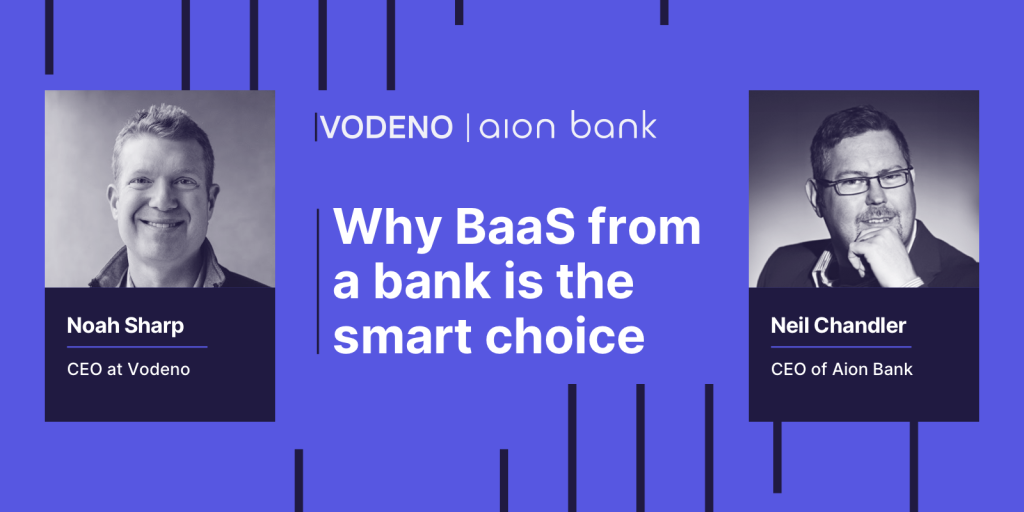To celebrate International Women’s Day, we spoke to Sheetal Nagraj, Chief of Staff at Vodeno to talk about her career and how mentors made a big impact on her journey.
- What inspired you to follow a career in tech?
My start in tech happened by chance, not by design. After earning my engineering degree, I was hired in the airlines domain working on mainframe technology. Although my degree was not computer science related, in those days in India, IT companies were recruiting engineering students, training them and starting on the onshore-offsite model for various companies.
When I look back, now being in business operations and strategy, I think the tech start gave me a solid analytical foundation and problem solving mindset. In my current role, I am really excited about working at Vodeno, where great technology is at the heart of the offering to clients and partners.
- When you think about your career journey, what are some significant milestones that shaped your journey?

For me, the first turning point came when I landed in the UK in Feb 2008 (if you remember, this was the Great Recession), and my project got shelved. After looking around, I landed a job at Visa Europe, doing something completely different from my previous role. I embraced it and moved to the business operations side, then my next turning point was when I was asked to work in technology as a delivery director; it gave me the chance to run some very big programs for Visa Europe, a huge learning curve.
The most significant change in my career was when I was at Paysafe, I got the opportunity to run the Banking portfolio, and execution was the centre of everything. I was working with FP&A teams to measure commercial benefits, and it taught me a lot. Additionally, while at Paysafe I met my current mentor and sponsor, who helped me think differently about my career moves.
I have always been a big enthusiast for mentoring and being mentored; it’s important to find the right fit for you and find multiple sponsors who represent your interests selflessly, even in your absence at the table…so to speak.
- How do these experiences help you in your current role?
I have an in-depth knowledge of payments from working at Visa and Paysafe, my experience working in technology means I understand APIs, end points, throughputs etc, and working on the business/commercial side allows me to understand COGS, margins and mark-ups – this really helps me gain a back to front perspective in any business.
When the opportunity came up to be Chief of Staff at Vodeno, I snapped it up as it helped me bring to the table the unique skills and previous experience of understanding technology and commercial aspects of a business with great execution at the heart of it in the BaaS domain.
- What excites you about Vodeno?
The people and the technology. When you speak to anyone at Vodeno, their passion is something you can’t miss; everyone is enthusiastic, putting in their best and contributing to the future. We have cutting edge technology at the heart of our offering, making it seamless for our clients and partners. As someone who has worked in different tech cultures, this pulls me in.
- What are some challenges you have faced in your career, and how did you overcome them?

Couple of challenges come to mind.
To be seen as a ‘business ops person/commercial person’, when you come from a tech background, was a hard transition.
Navigating the corporate world, understanding what value you can add, and what value the company can add to your profile can be challenging at times. To be able to navigate when you hit a (glass) ceiling, and judging if a lateral move would be more beneficial for your career than an upward move has been tricky.

Initially, I used to make career decisions myself (with friends and family) with no professional sounding board. Today, I use trusted line managers/mentors to bounce off my thinking on the various opportunities; this has made it easier to navigate my career, certainly make clearer decisions, even if challenges still exist. The advice of your trusted advisors will help inform and shape your decision making in future situations throughout your career.
- Are there any specific learning experiences that have been pivotal in your professional growth?

I learnt more from my mistakes than my successes. Early in my career at Visa, I made an error that resulted in a loss for a Tier 1 client. Although for their multi-million euro business, the error was not even a drop in the ocean, I had to present it to my department head to demonstrate controls that would ensure it does not happen again. I also had to present it to the client and reassure them. This taught me courage, how to face the mistakes and take ownership very early on.

Another such example came with managing people. I realised very quickly, every role, every target, every execution is manageable if you understand the people handling it and how to work with them to make things happen.
- Is there a project(s) or experience(s) that you are most proud of, and how have these achievements impacted your career?
At Paysafe, I set up the entire banking portfolio of delivery, product and technology, working with my colleagues in commercial and finance. This gave me confidence, visibility in the organisation, and exposure to senior management meetings and presentations. This built my understanding of business/commercial decision making.
In my current role, the exposure of working on a couple of projects with our lead investor, Warburg Pincus, helps me to understand how investors and clients see us, and how we take that view forward to build our future strategy.
- From your perspective, what technology trends do you see shaping the financial services sector?

Sounds cliched, but I think AI is revolutionary, and we will look back at this time when some people were sceptical and think…‘how was that?’ Deep machine learning has existed for a while, but we are finally at the point where the AI world will become the normalised world. Fraud detection, compliance services, fixing bugs are all compelling use cases for AI, and it can also be honed to make future predictions and trends to alter our regulations/rules to keep up with the needs of the growing trends and markets.
In payments, I think Web3 is an exciting space to see how we make the user journey more seamless, both in B2C and B2B.
- Looking ahead, what are your aspirations and goals within the technology industry? Are there any specific areas or projects you are keen to explore in the future?
Although the growth in BaaS and payment has been unprecedented in the last few years, we still have gaps that need to be addressed. Easy payments across borders is one…it shouldn’t take 3-4 days for payments to settle. There is a lot to do in this space and in peer-to-peer and B2B payments, especially in a heavily regulated region like Europe. This excites me; there is a need for innovation and technological intervention to move the payments experience forward.
- Balancing a career in business strategy can be demanding, how do you maintain a healthy work-life balance?

Weekends and holidays! I make sure that the time spent with family is more quality than quantity. My entire career is possible because of the absolute and unwavering support from my family. I owe it to them, and to I owe it to my own mental health and physical health to be present for my family.
My advice to others has always been to seek flexibility. If I am on a call at 8 pm missing time with my family, the next day I take time in the morning to get my daughter ready for school and join calls a bit later. That’s balance and flexibility. You have to find what works for you. Build a solid support network around you (there is a great video by Indra Nooyi, ex-CEO of Pepsi Co talking about this very topic).
- Mentorship is a passion of yours: how have influential mentors influenced your career?
They have been instrumental. I am not very religious, however in Hinduism we have a concept of a ‘guru’, a guide that shows you the way, or helps you clarify your own thoughts and bring structure in your approach. This is what my mentors do for me. I am very grateful to have them by my side. I hope I can do the same for others who see me as their mentor.
- For someone looking for a mentor, what do you recommend?

My biggest advice is that please don’t expect everything from one mentor. Have multiple mentors who help you develop different things. Also, please don’t mix the concept of a mentor versus a sponsor versus a coach. Sponsor is someone who ‘spots’ you and your talent/potential and helps you push for career opportunities. Mentor is someone who will help you with a given situation based on their experience, and this needn’t always be a promotion or a better job opportunity. The benefit of a mentor can be wider, helping you by acting as a sounding board and to be more considered when making decisions in your life.
- What do you think still needs to be done to get more women into technology?
Absolutely yes, 100%. There are different markets where the ratios are more encouraging. However, we still don’t see enough representation at the top. There is a stat that women drop off after senior, mid-management levels.
A lot is being done, however we need to continue to push further, and make a career in technology accessible through more mentoring and sponsorship. I want to see a day when no one raises an eyebrow at an all woman-board, they don’t today for an all-male board, and this becomes a norm.



